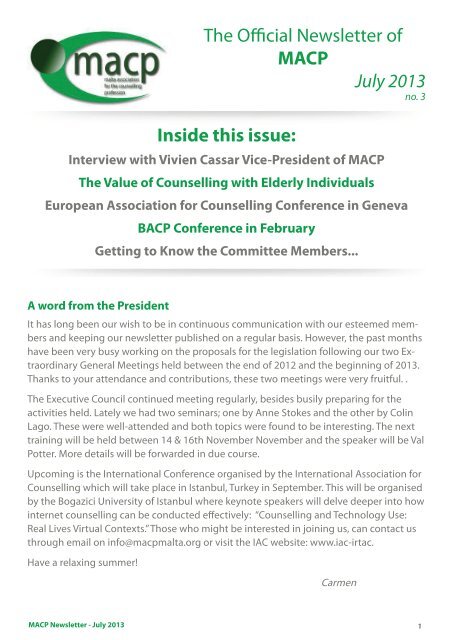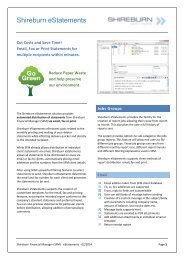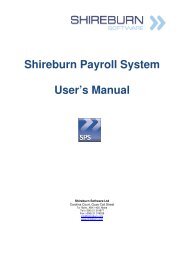MACP Newsletter 2.pdf - Shireburn Software Ltd
MACP Newsletter 2.pdf - Shireburn Software Ltd
MACP Newsletter 2.pdf - Shireburn Software Ltd
You also want an ePaper? Increase the reach of your titles
YUMPU automatically turns print PDFs into web optimized ePapers that Google loves.
The Official <strong>Newsletter</strong> of<br />
<strong>MACP</strong><br />
July 2013<br />
no. 3<br />
Inside this issue:<br />
Interview with Vivien Cassar Vice-President of <strong>MACP</strong><br />
The Value of Counselling with Elderly Individuals<br />
European Association for Counselling Conference in Geneva<br />
BACP Conference in February<br />
Getting to Know the Committee Members...<br />
A word from the President<br />
It has long been our wish to be in continuous communication with our esteemed members<br />
and keeping our newsletter published on a regular basis. However, the past months<br />
have been very busy working on the proposals for the legislation following our two Extraordinary<br />
General Meetings held between the end of 2012 and the beginning of 2013.<br />
Thanks to your attendance and contributions, these two meetings were very fruitful. .<br />
The Executive Council continued meeting regularly, besides busily preparing for the<br />
activities held. Lately we had two seminars; one by Anne Stokes and the other by Colin<br />
Lago. These were well-attended and both topics were found to be interesting. The next<br />
training will be held between 14 & 16th November November and the speaker will be Val<br />
Potter. More details will be forwarded in due course.<br />
Upcoming is the International Conference organised by the International Association for<br />
Counselling which will take place in Istanbul, Turkey in September. This will be organised<br />
by the Bogazici University of Istanbul where keynote speakers will delve deeper into how<br />
internet counselling can be conducted effectively: “Counselling and Technology Use:<br />
Real Lives Virtual Contexts.” Those who might be interested in joining us, can contact us<br />
through email on info@macpmalta.org or visit the IAC website: www.iac-irtac.<br />
Have a relaxing summer!<br />
Carmen<br />
<strong>MACP</strong> <strong>Newsletter</strong> - July 2013<br />
1
Upcoming Events 2013-14<br />
Look OUT!<br />
1. Training Week - November 2013<br />
2. Research Conference in Counselling - University of Malta<br />
3.European Association for Counselling Malta Conference<br />
4th - 6th April 2014<br />
Become a Member<br />
Practicing counsellors, students and kindred professionals<br />
are invited to become members of the Malta Association<br />
for the Counselling Profession. For further details<br />
visit our website or contact the <strong>MACP</strong> secretary, Paul<br />
Cutajar on: secretary@macpmalta.org<br />
<strong>MACP</strong> <strong>Newsletter</strong> - July 2013<br />
2
Interview with Vivien Cassar Vice-President of <strong>MACP</strong><br />
by Silvia Galea<br />
SG : Good morning Vivien. We met several years ago for the first time when you visited me as a<br />
counsellor on behalf of a client at my place of work. Tell me a bit more about yourself.<br />
VC: I cannot but start from my ‘unusual’ childhood because it had an enormous impact on me and who I<br />
am. Since my father was in the British army we travelled around a lot. I changed 4 primary schools and 2<br />
secondary schools during my school life. Of the latter, one was a boarding school<br />
in Germany and my GCE’s were done in Singapore where we spent three years.<br />
Now I am retired from the education division where I was a teacher of Maths and<br />
later a counsellor.<br />
SG: How did that change come about<br />
VC: Well when I got married in the early seventies married women had to resign<br />
from service and I did likewise although I taught for a year at a church school.<br />
When the children started coming (we have four) I was at home for 14 years doing part time teaching<br />
of English as a foreign language to German students mainly. I enjoyed it tremendously, it was exhilarating<br />
meeting so many people from different backgrounds but after a while I felt the urge to go back<br />
to schools. Being away for such a long time I felt I needed some kind of refresher course. At the time a<br />
course for a diploma in guidance and counselling was open and I applied.<br />
SG:What does being retired mean to you<br />
VC: I can’t say I really retired! I lectured at university, did work for the education division and long life<br />
learning sector besides voluntary counselling with an NGO. It is surprising how much work there is<br />
around for experienced people in the field of education. And the field of education and counselling really<br />
complement each other. Of course we are also always planning activities for our four grandchildren.<br />
Another aspect is trips abroad that are not limited to school holidays.<br />
SG: How does your counselling in the voluntary sector differ from the work in a school setting.<br />
VC: First of all I am working more with adults. This is the other side of the story, so it gives an interesting<br />
aspect of the fuller picture. I feel I can really guide parents in a way that I would not have been able to if<br />
I had not had the experience of listening ‘through the eyes’ of the youngsters I worked with in schools. A<br />
big thanks goes to them for providing such a wealth of narratives.<br />
SG: What characteristics do you believe have enhanced your work<br />
VC: I believe that the continuous training I have had through both education and counselling workshops,<br />
conferences and seminars have helped me to reflect continuously on my practice. Through these<br />
I have had feedback on various aspects of my work. Perhaps the ones I appreciate being blessed with are<br />
enthusiasm, sunny disposition, creativity and caring. It is important to be passionate about what you do<br />
otherwise it falls flat. Of course a number of people have been influential in shaping who I am, not least<br />
<strong>MACP</strong> <strong>Newsletter</strong> - July 2013<br />
3
my husband who has supported me in giving me space to be me and reach my aspirations.<br />
SG: Do you have any particular thoughts on counselling as it has developed<br />
VC: Perhaps what I am seeing since I first started is a less rigid aspect. When we first started training<br />
there seemed to be more demarcation in how one is ‘supposed’ to do it. Now I can see more flexibility in<br />
the stance a counsellor takes and it can be changed according to the needs of the client as well as from<br />
session to session. On the other hand, the aspect of counsellor/client relationship has increased in importance<br />
and is continuously being backed by research. The idea of supervision was not given so much<br />
importance either.<br />
SG: Any regrets<br />
VC: I have had a very satisfying life in all areas so not many. Through <strong>MACP</strong> contact with some top people<br />
in counselling has been enriching both personally and professionally. Of course the academic training<br />
that is being offered makes me wish it had come before. I feel I still have things to offer but lack the energy<br />
sometimes to follow through.<br />
The Value of Counselling with Elderly Individuals<br />
Populations are ageing worldwide (Myers, 1990).<br />
Lower birth rates together with a lengthening of the<br />
life span are two major contributing factors to the<br />
forecast of an ever-increasing greying population<br />
(Lanzieri, 2011). Given these predictions, the probability<br />
that counsellors will progressively encounter<br />
more elderly persons and their families as clients, is<br />
practically inevitable (Myers & Harber, 2004). Nonetheless,<br />
it appears that the counselling profession<br />
worldwide has been slow in responding to the<br />
needs of ageing individuals (Myers, 1984). Children,<br />
adolescents and adults, receive much attention in<br />
this line of work, however care and consideration<br />
is very rarely given to the ageing population and<br />
very often overlooked in this field (Orbach, 2003).<br />
Louisellle Grech - Vice-Secretary<br />
counsellors and therapists too have the tendency<br />
to perceive older clients as excessively rigid, and<br />
unwilling or unable to change. Of significant impediment<br />
is also the counsellor’s own dread and<br />
trepidation of their individual personal ageing process<br />
or of that of their loved ones (Yalom, 2008).<br />
Besides, the likelihood that many in the current cohort<br />
of elderly persons have been brought up with<br />
the belief that difficulties need to be resolved personally,<br />
does not make them receptive and amenable<br />
to seek support (Blando, 2011; Myers, 1990).<br />
These arguments, together with a lack of recognition<br />
and acknowledgement from academia, may<br />
very generally account for this lacuna within the<br />
realm of counselling (Maples, 2007; Myers, 1990).<br />
According to literature, the reasons for this exclusion,<br />
so to speak, may be various (Blando, 2011; Cohen,<br />
1977; Gay, 1988: Maples, 2007; McDonald & Haney,<br />
1988; Myers, 1990; Orbach, 2003). Freud himself, for<br />
instance, believed that therapy was not suitable for<br />
clients over the age of 50, since, in his opinion, they<br />
lacked mental elasticity, and consequently, were not<br />
considered as educable (Gay, 1988: Orbach, 1996).<br />
The notion that you can’t teach an old dog new tricks<br />
seems to have significantly influenced and reinforced<br />
negative perceptions and stereotypes - namely, that offering<br />
counselling or therapy to an elderly population<br />
is basically an unproductive endeavour, an absolute<br />
waste of time and energy (McDonald & Haney, 1988).<br />
Consistent with this idea, Cohen (1977) implied that<br />
<strong>MACP</strong> <strong>Newsletter</strong> - July 2013<br />
Yet new scientific breakthroughs in the last decades<br />
have, in effect, have demonstrated and established<br />
the malleability, adaptability and resilience of even<br />
the very old brain, expounding its ability for plasticity<br />
and thereby generating opportunities for positive<br />
change even throughout adult life (Cohen, 2005;<br />
Guns, 2008; Hof & Mobbs, 2009; Tyler et al., 2010).<br />
Additionally, literature based on numerous studies,<br />
has confirmed that counselling and therapy with<br />
elderly clients is not only effective, but worthwhile<br />
and valuable (Blando, 2011; Cohen, 2005; Haight<br />
& Gibson, 2005; Hill & Brettle, 2005; Knight, 2004;<br />
Kunz & Gray Soltys, 2007; Maples, 2007; Myers,<br />
1984; Myers, 1990; Myers & Harper, 2004; Myers,<br />
Poidevant & Dean, 1991). A psychoanalytic ap<br />
4
proach for instance, with its focus on issues such as<br />
loss, childhood experiences and transference, has<br />
been reported to have categorical constructive outcomes<br />
in the work with older individuals (Blando,<br />
2011). Cognitive Behaviour Therapy is also considered<br />
to be an effective and efficient approach<br />
with older adults (Blando, 2011). Its concentration<br />
on the present, the fact that it is highly structured,<br />
practical, goal-oriented, emphasizes skill enhancement<br />
and self-monitoring and is also psycho-educational,<br />
make CBT another favoured technique<br />
(Blando, 2011; Haight & Gibson, 2005; Myers, 1990).<br />
According to psychiatrist and geriatrician, Robert N.<br />
Butler (1975), Reminiscence Work is considered as<br />
a very generative and restorative approach when<br />
working with elderly clients. Although it can be<br />
organized individually, it is customarily conducted<br />
in groups and may operate effectively at different<br />
levels (Blando, 2011). It not only increases<br />
social interaction, but fosters a sense of accomplishment<br />
and self-worth; it encourages creativity,<br />
and amplifies feelings of belonging and togetherness,<br />
often also aiding in alleviating<br />
depression (Blando, 2011; Knight, 2004; Orbach,<br />
2003; The Benevolent Society, 2005).<br />
Similar but not quite the same, is the procedure of Life<br />
Review, also introduced by Robert N. Butler. This approach<br />
has a more structured slant and is frequently<br />
carried out individually (Blando, 2011). Founded on<br />
Erikson’s principles of human psychosocial development,<br />
the challenge in the particular life stage is<br />
Age is a question of mind over<br />
matter. If you don’t mind, it<br />
doesn’t matter.<br />
Leroy Paige<br />
to strive towards integrity, to put life in perspective<br />
and to assimilate past psychological themes into a<br />
new level of psycho social understanding and meaning,<br />
hence the term Life Review (Woodward, 1997).<br />
Striving to make sense of the life lived, encourages<br />
and supports reorganization, reconciliation and<br />
resolution (Butler, 1975; Woodward, 1997). The<br />
emphasis here therefore is on analytic and cognitive<br />
functioning and understanding (Blando, 2011).<br />
Resolving feelings about past failures or guilt about<br />
mistakes, grieving changes and losses encountered<br />
throughout life, remembering and celebrating successes<br />
and the many positive things that have happened<br />
during the years, are amongst the issues that<br />
are contended with during a Life Review session<br />
<strong>MACP</strong> <strong>Newsletter</strong> - July 2013<br />
(Blando, 2011; Kunz & Gray Soltys, 2007; Myers, 1990).<br />
Another analogous approach is that of Guided<br />
Autobiography, developed by James E. Birren, a<br />
gerontological theorist in the area of neuro-cognition<br />
and psychology. This approach encourages<br />
individuals to write their personal life story over<br />
a number of sessions and share it with others in<br />
the group (Birren & Cochran, 2001). This method<br />
not only facilitates a deeper and more profound<br />
understanding of the past but also supports the<br />
rich ness, intricacies and appreciation of how individual<br />
personal identity is fashioned by the<br />
“crosscurrents” in life (Birren & Cochran, 2001, p. 5).<br />
Contrary to what seems to have been a long-standing<br />
belief that counselling with older adults is futile, in<br />
effect is, or could be, a viable and promising prospect<br />
of service. As Blando (2011) so aptly claims, focusing<br />
on wellness, on strengths, on resilience and on the<br />
qualities that believe and allow people to grow and<br />
thrive, may not only result in the improvement of<br />
the overall functioning of the ageing individual, but<br />
may, in addition, be a positive and constructive development<br />
within the counselling profession itself.<br />
In view of the changing demographics and the remarkable<br />
increase in the projected global number<br />
of older persons (Lanzieri, 2011; Longman, 2010;<br />
Myers, 1990; Riedel-Heller, Busse & Angermeyer,<br />
2005), described by Maples (2006) as “The Silver<br />
Tsunami,” it may be timely, and of the essence, that<br />
this predicament be given heed, and that counselling<br />
services are made more available and accessible<br />
to elderly individuals who live in the community as<br />
well as to those who live within a residential setting.<br />
5
References:<br />
Birren, J. E., & Cochran, K. N. (2001). Telling the stories of life through guided autobiography groups.<br />
Maryland: The Johns Hopkins University Press<br />
Blando, J. (2011). Counseling older adults. New York: Routledge<br />
Butler, R.N. (1975). Why survive being old in America. New York: Harper & Row<br />
Cohen, G. D. (1977). Mental health services and the elderly: Needs and options. In<br />
J.E. Myers. (1983). A national survey of geriatric mental health services Journal of Mental Health Counseling,<br />
5, (2), 69-74. Retrieved from http://libres.uncg.edu/ir/uncg/f/J_Myers_National_1983.pdf<br />
Cohen, G.D. (2005). The mature mind: The positive power of the aging brain. New York: Basic Books<br />
Gay, P. (1988). Freud: A life for our time. London: W.W. Norton & Company <strong>Ltd</strong><br />
Guns, B. (2008). Rewire your brain rewire your life: A handbook for stroke survivors and their caregivers.<br />
California: WingSpan<br />
Haight, B., & Gibson, F. (2005). Burnside’s working with older adults: Group process and techniques (4th<br />
ed). Boston: Jones & Bartlett<br />
Hill, A., & Brettle, A. (2005). The effectiveness of counselling with older people: Results of a systematic<br />
review. Counselling and Psychotherapy Research, 54, 265-272. Retrieved from http://usir.salford.<br />
ac.uk/1098/1/op_cpr_final_proofs.pdf<br />
Hof, P. R., & Mobbs, C.V. (Ed). (2009). Handbook of the neuroscience of aging. California: Elsevier Inc<br />
Knight, B. G. (2004). Psychotherapy with older adults. (3rd Ed). California: Sage Publications Inc<br />
Kunz, J. A., & Gray Soltys, F. (2007). Transformational reminiscence: Life story work. New York: Springer<br />
Publishing Company<br />
Lanzieri, G. (2011). The greying of the baby boomers: A century long-view of ageing in European<br />
populations. Population and Social Conditions, Eurostat Statistics in Focus. Retrieved from http://<br />
epp.eurostat.ec.europa.eu/cache/ITY_OFFPUB/KS-SF-11-023/EN/KS-SF-11-023-EN.PDF<br />
Longman, P. (2010, November). Think again:Global aging. Foreign Policy. Retrieved from http://www.<br />
foreignpolicy.com/articles/2010/10/11/think_again_global_aging<br />
MacDonald, P. A., & Haney, M. (1988). Counseling the older adult: A training manual in clinical gerontology.<br />
(2nd ed). San Francisco: Jossey-Bass Publishers<br />
Maples, M. F. (2006). Gero-counselor prepare: The silver tsunami is headed our way. Retrieved from<br />
http://counselingoutfitters.com/vistas/vistas05/Vistas05.art07.pdf<br />
Maples, M. F. (2007). Spirituality, wellness and the ‘silver tsunami’: Implications for counseling. Retrieved<br />
from http://counselingoutfitters.com/vistas/vistas07/Maples.htm<br />
Myers, J. E. (1984). Aging and counseling: Developing a partnership. Gerontology and Geriatrics Education,<br />
4, (2), 67-73. Retrieved from http://libres.uncg.edu/ir/uncg/f/J_Myers_Aging_1984.pdf<br />
Myers, J. E. (1990). Aging: An overview for mental health counsellors. Journal of Mental Health Counseling,<br />
12, (3), 245-259. Retrieved from http://libres.uncg.edu/ir/uncg/f/J_Myers_Aging_1990.pdf<br />
Myers, J. E., & Harper, M.C. (2004). Evidence-based effective practices with older adults. Journal of<br />
Counseling & Development, 82, (2), 207-218. Retrieved from http://www.uncg.edu/ced/jemyers/<br />
jem_info/docs/Myers,%20Harper,%202004-Evidence-based%20Effective%20Practices%20with%20<br />
Older%20Adults.pdf<br />
Myers, J. E., Poidevant, J. M., & Dean, L. A. (1991). Groups for older persons and their caregivers: A review<br />
of the literature. Journal for Specialists in Group Work, 16, (3), 197-205. Retrieved from http://<br />
libres.uncg.edu/ir/uncg/f/J_Myers_Groups_1991.pdf<br />
Orbach, A. (1996). Not too late: Psychotherapy and ageing. London: Jessica Kingsley Publishers<br />
Orbach, A. (2003). Counselling older clients. London: Sage Publications <strong>Ltd</strong><br />
Riedel-Heller, S.G., Busse, A., & Angermeyer, M.C. (2005). The state of mental health in old-age across<br />
the ‘old’ European Union - a systematic review. Acta Psychiatrica Scandinavica, 113, (5), 388-401<br />
doi:10.1111/j.1600-0447.2005.00632.x<br />
The Benevolent Society. (2005). Reminiscing handbook. Reminiscence Manual Version 1. Retrieved<br />
from http://www.bensoc.org.au/uploads/documents/reminiscing- handbook-jan2006.pdf<br />
Woodward, K. (1997). Telling stories. California: Occasional Papers Series Retrieved from http://<br />
townsendcenter.berkeley.edu/pubs/OP09_Telling_Stories.pdf<br />
Yalom, I.D. (2008). Staring at the sun: overcoming the dread of death. Great Britain: Piatkus Books<br />
<strong>MACP</strong> <strong>Newsletter</strong> - July 2013<br />
6
International Association<br />
For Counselling<br />
Annual IAC Conference 2013<br />
IAC Conference 2013<br />
8-11 September, 2013, Boğaziçi University<br />
in İstanbul, Türkiye<br />
We would like to invite you to our joint<br />
international counselling congress;<br />
the 2013 International Association<br />
for Counselling (IAC) Conference and<br />
12th National Congress of Psychological<br />
Counselling and Guidance, which<br />
is being hosted by Boğaziçi University<br />
in İstanbul, Türkiye in September 8-11,<br />
2013.<br />
For more information, please visit the<br />
our website or contact us through the<br />
following social media coordinates:<br />
http://www.iac-pdr-istanbul2013.org<br />
Still in time to register - Book your place<br />
Become a Member of the European Association for Counselling<br />
and get accredited as a Counsellor at a European Level through<br />
<strong>MACP</strong><br />
(terms and conditions apply)<br />
Special Offer<br />
€25 instead of €50<br />
For more information visit: www.eac.eu.com<br />
or write to: info@eac.eu.com<br />
<strong>MACP</strong> <strong>Newsletter</strong> - July 2013<br />
7
EAC Conference in Geneva<br />
26-28th October 2012<br />
Jesmond Friggieri<br />
The slogan behind the EAC Geneva Conference and the Annual General Meeting, which was held during<br />
the Conference was “EAC the driving force behind European counselling”.<br />
The EAC Annual General Meeting<br />
This was an important Annual General Meeting for the EAC as new Statute and Operating Regulations<br />
were brought to the Assembly for approval for almost 20 years of operation. The aim of the new Statutes<br />
and Operating regulations was to make the EAC more efficient and effective within the European<br />
context.<br />
The Statute and Operating Regulations<br />
were approved. This was the first time that<br />
<strong>MACP</strong> was represented in the EAC General<br />
Assembly as it was preparing to become a<br />
member of the the same association. Actually,<br />
in 2013 <strong>MACP</strong> was approved as an interim<br />
member and is participating actively<br />
within the organisation.<br />
The Conference<br />
The conference consisted of three key note<br />
speeches by prominent psychotherapists<br />
Photo: www.eac.eu.com - Opening of the Conference<br />
and counsellors namely:<br />
1. Prof Emmy van Deurzen who spoke<br />
about “Counselling and the major challenges of depression and anxiety”: Happiness is at the centre<br />
of the humanity and the role of the counsellor is to bring the ray of hope and relief from the burden of<br />
depression and anxiety that might overwhelm any individual in everyday life especially during illness.<br />
2. Prof Colin Lago who focused on “Relational Challenges to Successful Therapy” , contended that<br />
difference, diversity and the therapeutic dialogue are at the centre of any therapy. The successful<br />
counsellor-client dialogue is based on the common essence of any dialogue which includes:<br />
- immediacy of presence,<br />
- emergent unanticipated consequences.<br />
- the strangeness of others,<br />
- the collaborative orientation,<br />
- the vulnerability of the human being,<br />
- the mutuality between the two actors within the dialogue,<br />
- the temporal flow and<br />
- the genuineness and authenticity that should underlie any dialogue.<br />
3. Prof Andew Samuels who is a Jungian psychanalyst spoke about the “Collective Fields of Emotions”.<br />
The inner distress of humans is shared by the society and the ability of the counsellor is to facilitate the<br />
process of decoding this negativity. The collective feeling is based on four aspects:<br />
- Economics and inequality<br />
- Leadership<br />
- Violence and aggression<br />
- Promiscuity.<br />
The Conference has also a number of workshops held by speakers from all around Europe presenting<br />
different approaches to counselling.<br />
<strong>MACP</strong> <strong>Newsletter</strong> - July 2013<br />
8
BACP Summit and ‘An Evening with Irvin Yalom’<br />
4th & 5th February 2013<br />
Carmen Galea<br />
An Evening with Irvin Yalom<br />
Irvin addressed the delegates before being interviewed<br />
by his son, Victor, and then took part in a live<br />
Q and A session. This exciting event was followed<br />
the next day with a one-day conference where we<br />
explored how we can best deliver an effective 21st<br />
century service and examine the dilemmas faced by<br />
therapists in balancing personal commitment to a set<br />
of core values against the increasing need to compete<br />
for funding based on commercial principles.<br />
The conference was organised by The British Association<br />
for Counselling & Psychotherapy (BACP) (http://<br />
www.bacp.co.uk) primarily for its own members. Other<br />
National Counselling associations were invited to attend.<br />
Photo: http://www.lesoir.be/<br />
The BACP Summit<br />
The summit focused on:<br />
- Counselling as an established profession in the health sector.<br />
- Helping clients improve their social relationships, improves mental health<br />
- No one survives without community and no community thrives without the individual<br />
- Objective/s of the mission or general overview of the mission<br />
- The importance of professionalism.<br />
The outcomes were a set of values that the Counsellor should endorse:<br />
- Aspiration for altruism - Accountability<br />
- Integrity - Respect for others<br />
- Celebrating success - Vision & discernment<br />
- Kindness, compassion & continuity - Retaining what works & hange to meet<br />
challenge<br />
The Summit also discussed the following 5 themes:<br />
1. The role ‘Talking Therapies’ has in the 21st century in improving the public’s health<br />
2. Core values and the ethical dilemmas in the 21st century<br />
3. Evidence measures in the 21st century: building a new evidence base<br />
4. Technological development is transforming how we engage with self, peers &<br />
Professionals. How does this impact what we view as therapeutic practice in the<br />
digital age<br />
5. Establishing a profession in the ever changing NHS and the challenges we all face<br />
<strong>MACP</strong> <strong>Newsletter</strong> - July 2013<br />
9
Getting to know your Executive Committee (part 1)<br />
Bios and Profiles of <strong>MACP</strong> Board Members<br />
Carmen Galea – President<br />
Carmen Galea is a school counsellor in the primary & secondary schools within a College,<br />
with a special interest in family therapy, play therapy techniques & sandplay. As a<br />
visiting lecturer at the University of Malta she addresses issues of child abuse & neglect<br />
to undergrads and introduces basic counselling skills to MCouns students. She is the<br />
President of the Malta Association for the Counselling Profession (<strong>MACP</strong>) and a founding<br />
member on the Management Committee of Home-Start Malta. She is the membership<br />
chair of the International Association for Counselling (IAC) and the co-ordinator of the Hans Hoxter Fund<br />
offered by IAC<br />
Vivien Cassar – Vice President <strong>MACP</strong><br />
Vivien Cassar is a retired school counsellor. Her areas of expertise are working with children<br />
and parents; adult training in personal and social skills. She is a member on various<br />
boards including the Executive Council of <strong>MACP</strong>, St Jean Antide Foundation (NGO). Offers<br />
her services as a counsellor in the community through the above Foundation.<br />
Paul Cutajar - Secretary <strong>MACP</strong><br />
After qualifying as a School Counsellor in 2006, Mr Paul Cutajar joined the team of<br />
counsellors at the Secretariat for Catholic Education. Furthermore, given his postgraduate<br />
training in Systemic Practices, since 2002, he also works with families within<br />
the local government social work agency, SEDQA. Therefore his main areas of interest<br />
are counselling children and adolescents, and also individual and family counselling. In<br />
addition to his qualifications in counselling and systemic practices, Mr Cutajar holds a<br />
post-graduate certificate in education, an Honours Degree in Theology and a Bachelor of Arts in Philosophy,<br />
Psychology and Sociology. He has also completed his Master Degree in Counselling, with a specialization<br />
in Health Counselling.<br />
Louiselle Grech – Vice Secretary <strong>MACP</strong><br />
Besides being a qualified PSD teacher (BA Psychology & Social Studies; PGCE Lifeskills),<br />
Louiselle currently holds the post of Acting Counsellor at St Margaret College. She is<br />
responsible for the Counselling and Guidance duties of both a Primary and Secondary<br />
School of the College. Although she has worked with children for the past three<br />
years and with adolescents for the last eighteen years, other areas of interest include<br />
reminiscence work and the elderly. In addition to a Certificate in Gestalt Psychotherapy, Louiselle holds a<br />
Diploma Social Work and a Diploma in School Counselling. She has also just completed a four year part<br />
time Master’s course in Counselling with the University of Malta.<br />
Dr Ruth Falzon – Treasurer <strong>MACP</strong><br />
Dr Ruth Falzon is a lecturer within the Department of Counselling at the University of<br />
Malta . Her areas of expertise include Personal and Social Development (PSD) and Learning<br />
Disabilities/Specific Learning Difficulties. She designs and coordinates the PSD teacher-training<br />
programmes and PSD modules at the University of Malta. Her publications<br />
and research interests include studies on PSD, Emotional Literacy, dyslexia and quality of<br />
life, and counselling skills and dyslexia. Dr Falzon is treasurer of the International Association for Counselling<br />
and the Malta Association for the Counselling Profession; a member of the executive councils of the<br />
Malta Dyslexia Association and Homestart Malta; and president of the Association for Professionals in<br />
Learning Disabilities and her community primary school. ruth.falzon@um.edu.mt.<br />
(to be continued)<br />
<strong>MACP</strong> <strong>Newsletter</strong> - July 2013<br />
10








